Dear Friends
Sometimes saying goodbye to an old friend is just the right thing.
It was one of those winter afternoons where I was walking through the cattle earlier this week, and it had spit snow all day. The wind was up a little, and the breeze was sharpening, as the sun finally crept out from under the dense cover of gray cloud that had hung over the valley all day.
That meant only one thing: it was going to be cold that night. We have no humidity in our high and dry climate, and when the blanket of clouds slides off, the heat goes straight up into the stratosphere. It was going to plummet toward zero.
The beeves already showed a hint of cold over their thick coats, as evidenced by a little tinge of rime on the ends of their longest hairs (at this time of year, most of them have up two inches of long and curly hair over their grass-fat bodies). They raised their heads above the piles of green hay that the girls had just spread out for them, and with belly full, they figured they’d better see what the boss was up to. They came running over, bucking with joy when they saw me walking around the big meadows. I had two dogs with me: Allie, the Great Pyrenees, and Clyde, my ever-present border collie companion.
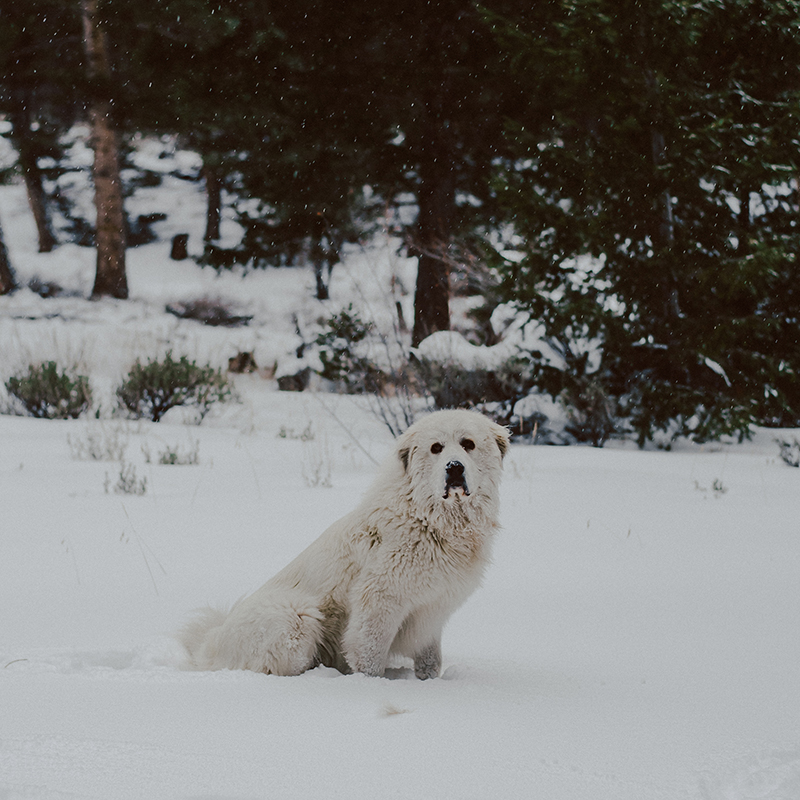
The great white dog, as always, was sort of a plaything for the cattle. She didn’t have herding in her blood—just protection—and the cattle knew it. They just flat out chased her for fun. She was used to their playful harassment, and didn’t take it very seriously.
On the other hand, when they noted the smaller canine of Clyde, his border-collie stance caused them to halt in some semblance of respect. Their view of him mirrored his view of them: to Clyde, they were simply prey animals; to the beeves, border collie was predator.
“Clyde, easy now,” I said. “You’re on a down.” The steers were only 3 feet away now, and Clyde obediently laid down in the snow, head down and ears back.
The steers dared to take another few inches, now blowing steam over the border’s face. I knew they were about to cross a line. “Clyde.”
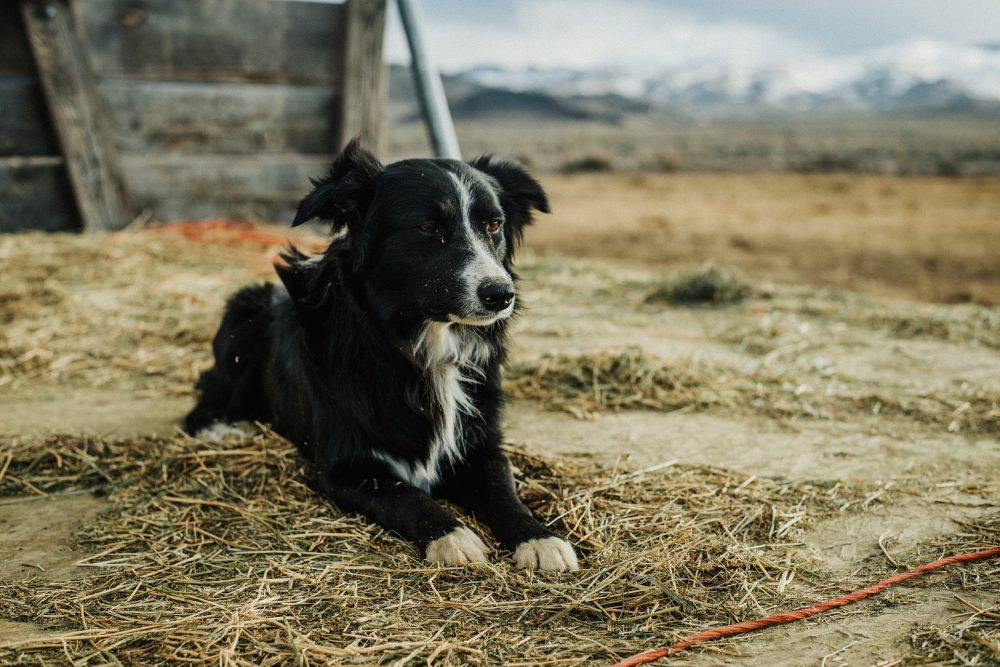
His eyes darted to me.
As was normal, the wave of incoming cattle parted around Clyde, but surrounded Allie. And as is also normal (just as is with human with other members of humanity), some decided they must push the boundary of border collie. Two big black steers stopped when they saw Clyde, and slowly approached; sniffing the air, heads near the ground, hoping to identify him on this day as friend or foe.
“Easy now. Remember, you’re on a down.”
He began shaking. His body was a coiled spring, and I knew it was almost asking too much. In another moment, it would be. Because when 900 lb. black Angus steer extends tongue for a lick of border collie nose it is simply outside of the realm of dignity for a self-respecting black and white herding dog. In their brain is a hard-wired concept of the relation between herder and the herded; more anciently the predator and the prey.
There was no getting around it.
Steers were now one foot away. Nose fog enveloping dog. And I knew the line was about to be met. And so, I released him.
“Free dog.”
Clyde gave me a sidelong look and waited for his moment, his entire body trembling now. Steer G142 took 2 more inches and crossed a line in the snow. Dog exploded, canine teeth in full display. Game over. Both steers were launched backward, 900 pounds almost clumsily pulling off a backflip, blowing snot. Clyde nipped one in the heel as they turned. Tails went up in the air in feigned terror as the two gallop-buck joyfully and rejoined the herd. Clyde, dignity regained, returned to my side, sat in the snow and looked up into my eyes.
“Stupid cattle,” I’m thinking he said. “Always gotta push that envelope.”
“Dang right, Clyde. But you taught ’em.” My eyes met his, and connected. “That’ll do. Good dog.”
His tail swept the snow once, swishing one snow angel wing as he sat by my leg.
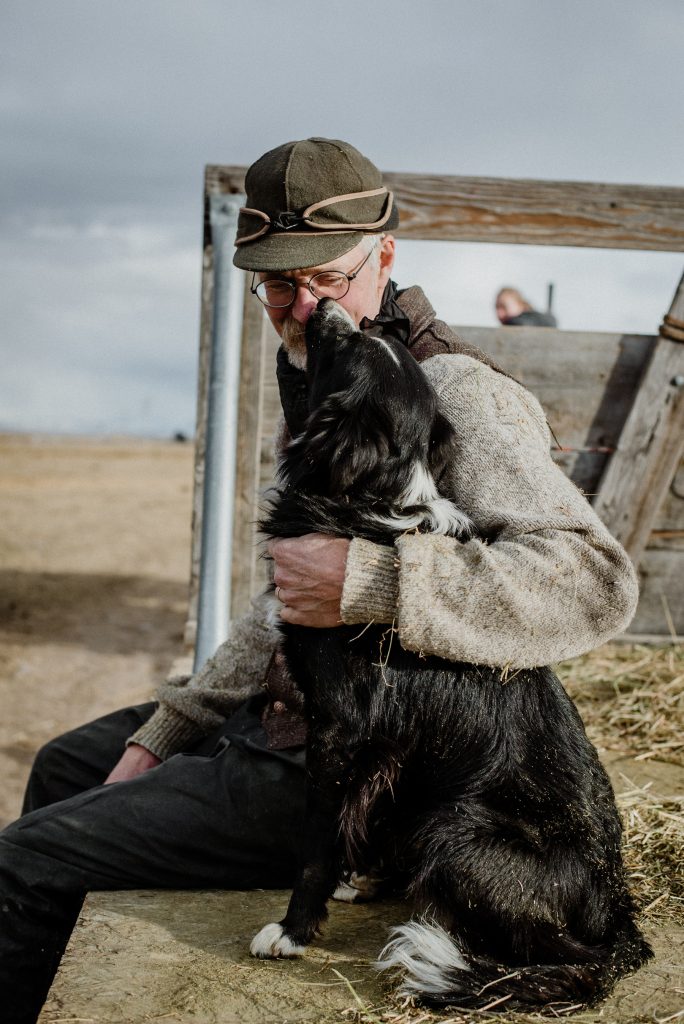
The herd keeps filing by, checking us out. It was a curtain of 200 black bodies, and when the stragglers of it passed, there remained one lone body, unmoving, turned toward me, a hundred feet away.
It was Belle, the big Belgian draft mare. She was what we call a blondie—a blaze faced sorrel horse with a beautiful flaxen mane and tail. She had been on retirement for five years now, and hadn’t been in harness for all of those years. The heavy loads of hay in deep snow were delivered to her now—no longer did she deliver them.
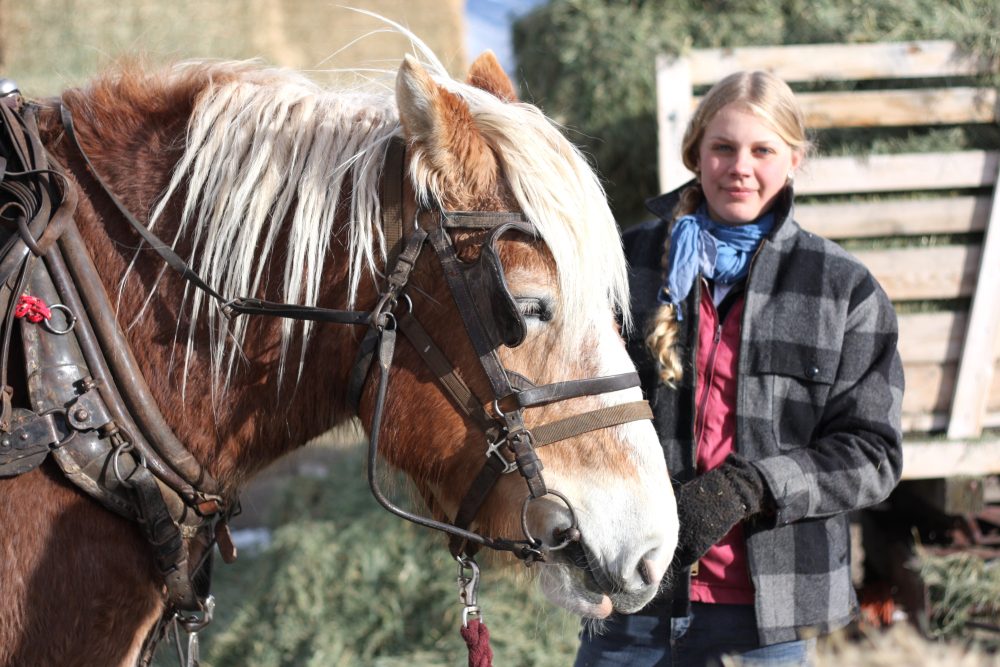
When a horse comes into retirement, we simply let them stay on the ranch as long as they are well, and free of pain. It might be a saddle horse who simply can’t go day after day, or mile after mile in our rough mountain country like a young one would. Or a heavy draft horse where a knee joint slowly deteriorates. The bone on bone causes enough discomfort when hitched up to a 3-ton wagon load of hay, and now begins to affect their gait in harness.
I walked toward the old mare, and thought about our history together. She’d been with us for probably 12 years, and we sort of rescued her and her gelding cousin from a not-so-great life at a suburban holding in Salt Lake City. Abby, Melanie and I guessed she was around 17 or 18 years old when we picked them up. They were both a little unbroke, and her gelding buddy, though well matched in size, was a much younger cantankerous and disconnected upstart named Jingle.
She put up with him as a team member. I don’t know why, but she did. Belle had every right to bite him and kick the crap out of him. He stupidly knocked her down on several occasions, and only after we (the girls, Ethan and I) finally connected with his mind did the nonsense stop. The mind of Jing never was tamed; he would always be wild at heart. But we found an inroad of relationship and trust with him, and he became a member of us.
And so did she. She always had trusted us, but with Jingle no longer a freak-show all the time (in his previous life, full gallop chariot-like runaways were fairly common), she softened in the knowledge that explosion of her harness-mate was no longer imminent. I think I could feel some peace; perhaps some gratitude from the thoughtful mare.
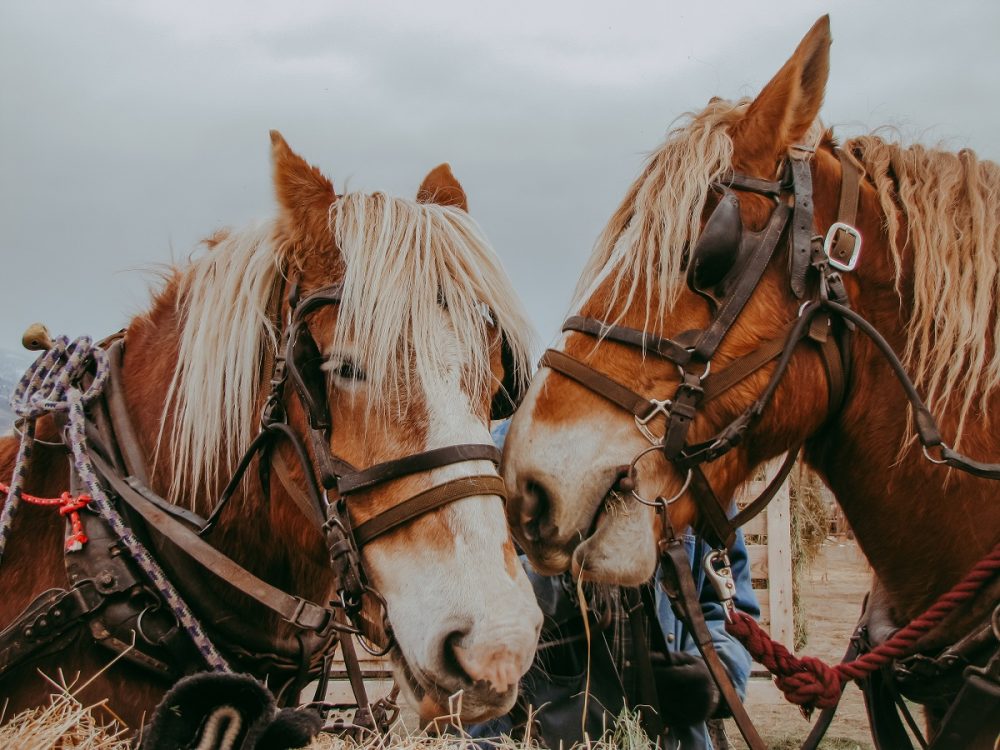
Now she was watching me as I approached. I put Clyde on a down, and Allie was off doing her own thing. I stopped 10 feet away.
And she slowly put one foot in front of the other, closed the gap between us, and put her head against mine.
I reached into the depth of long hair on her neck and below her mane, and gently but firmly stroked her with the grain of hair.
She leaned into my hands, gratefully. My hands wandered to her rib cage. Amazingly, at around 30 years of age, she still had a decent cover of fat over her ribs. Her hind quarters betrayed her age, however. Hip bones were starting to protrude from the aging flesh and lack of muscle tone that age had created. Three decades of life was exceptionally old for a draft horse.
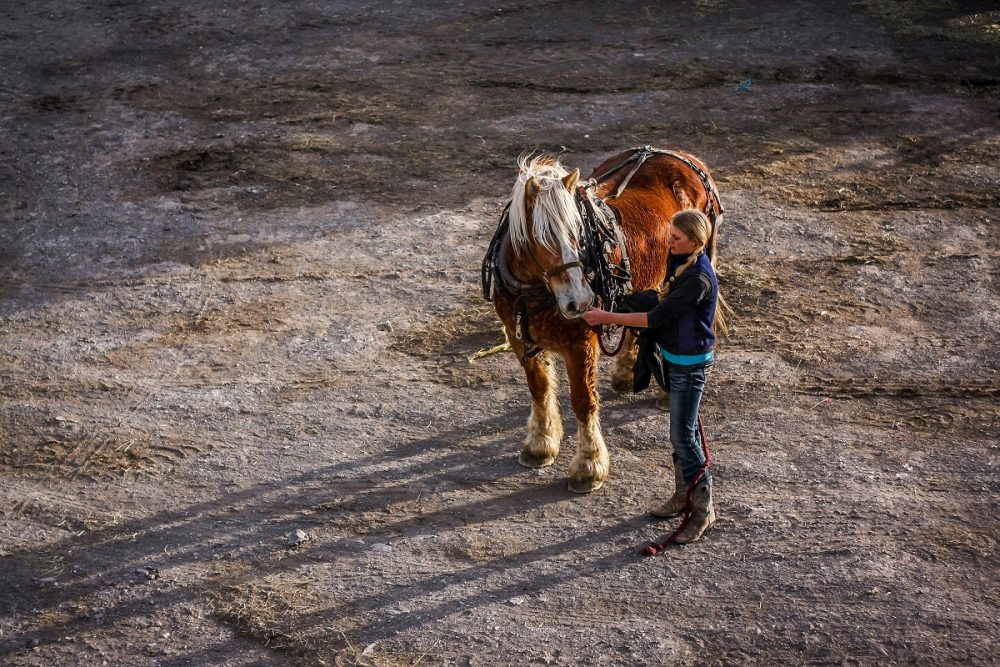
I stepped away—backwards, as I watched her follow me. Yes, there it was. A big hesitation from the pain in step from the left hip. Arthritis. It was getting worse. Her eyes, always soft, were getting dull, with pain or tiredness, I couldn’t tell.
We had been watching the old girl for about a year now. Slow decline was the byword. She showed her age in other ways—graying hair, less than a twinkling eye, wrinkles in her muzzle and a more pronounced bone. During the green grass season, she kept muscle tone. But toward the end of the summer, I was concerned.
As winter came, we’d been checking on her every day. She didn’t pack the amount of fat I like to see going into the winter. It was her hind-end I most worried about. She just didn’t smooth out the way I like a horse to be by the time fall rolls around. It meant that she probably wouldn’t be able to keep up when temps drop below 20 degrees. When that happens, on a full-grown horse, despite the twofold aspects of heat maintenance (long fur and a high body mass to surface area ratio), the budget tips, and part of the daily graze of a large animal starts going right into the simple need to keep warm.
Above 20 degrees, just their basic metabolism is enough to keep them warm. Below it, they must eat more to keep warm. When temps go way below zero (or get to feel that way, depending on the wind chill) despite eating all an animal can, they start burning their fat reserves. It’s why we try to harvest high energy hay, so that even at 25 below zero, a horse or cow can keep up.
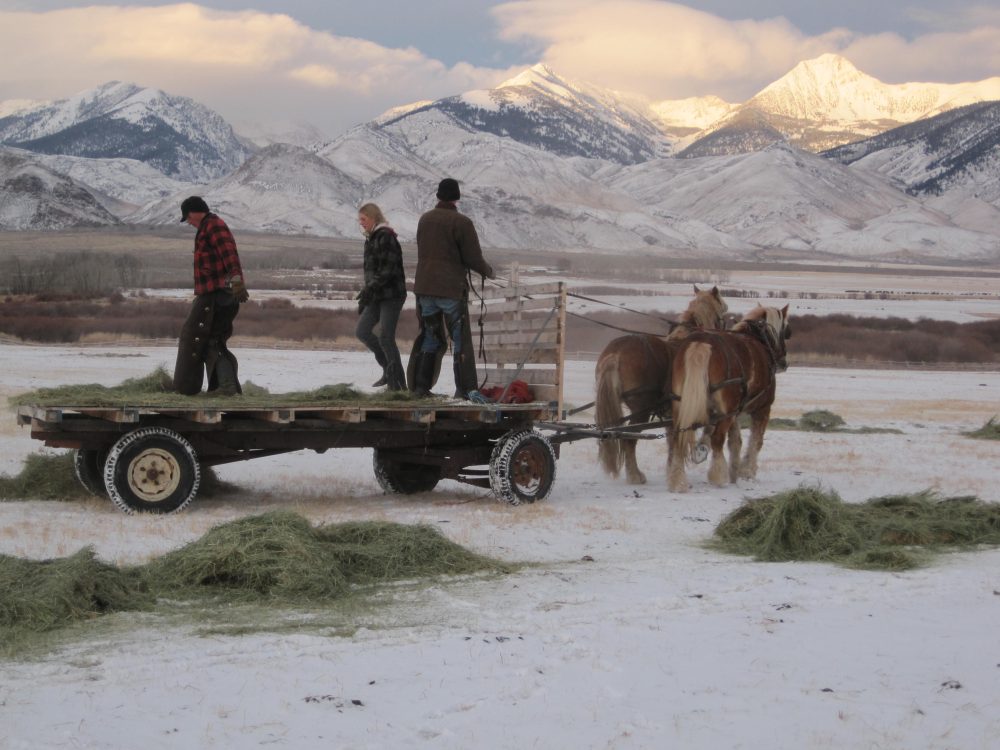
And that was why we were concerned about Belle.
She no longer had to walk for food, we brought it to her. But her other equine retiree friends were on the far side of the meadow today—she didn’t have the energy left to stay with them. Instead, she had befriended the bovines—a lower form of life in the minds of many of our equine partners if their attitude and apparent impatience with cows was any indication. And the bovines had taken her in. It was often that I observed one or two younger steers or heifers standing close, bodies touching.
But that behavior was telling about something else. Was she getting enough to drink? It’s counterintuitive, as there is no heat in the winter. But if she wasn’t drinking enough, she could not possibly eat enough. Dry hay needs water to process it. Otherwise, even great energy-containing hay and grain doesn’t help.
The sweet mare pressed into me as I massaged her neck. The low sun backlit her late-in-life flaxen white mane to a glowing beauty. The clouds were rolling back to reveal the deep blue of a midwinter and cloud-free sky. The sun was courting the horizon. I felt the chill wind on my face, and calculated from experience what tonight would be like. Subzero, most likely, with a slight wind across the prairie.
And I knew what I had to do; it was time.
She didn’t have enough body mass to keep from getting cold. She simply couldn’t consume enough hay or even grain to maintain. And I could never rest easy at night knowing that one of those in our care—even though there are literally hundreds—was going to get cold. Chilled. Shivering, and not able to get warm. If she went down, she would die slowly, freezing gradually into the ground.
The barn would never do for her. All of our horses and cattle are not indoors raised. She would feel imprisoned if we put her there, stressed and frantic to get out. I didn’t want to put her through that.
And as I looked into her eye, and felt her lean into me, I felt as though she was asking. She’d had a good life, after all, and in her sort of way with her trust and feel, I felt a quiet gratitude. Here, on Alderspring, it had been good. Even the work had been that way, and the humans had always been so kind to this one, this Belle.
And so, I led her just a little ways out into the meadow, and reached into my pickup for my .270 rifle. I put the dogs in the soundproofing of the truck, and walked over to my Belle, one last time, and thanked her with a hug to her neck, and then stepped thirty feet away.
I never get used to the end, but I am careful to do it perfectly with one shot. It is something I will never enjoy, although I know it is right. It was instantaneous, and absolutely pain free. She would not be cold this night, or ever again, nor would she have to ever again struggle to move against the pain of arthritis.
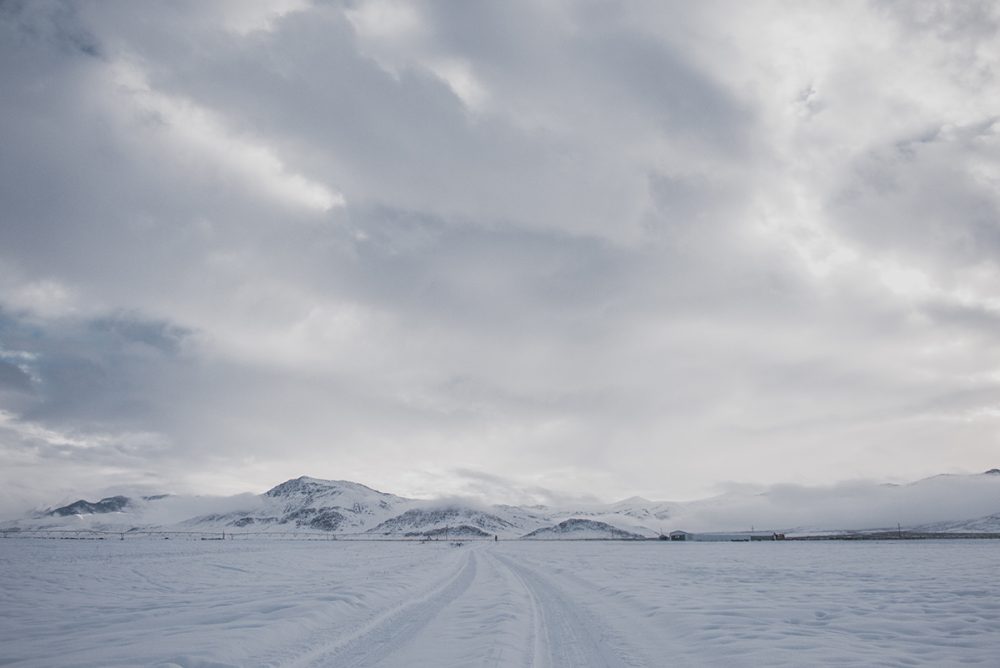
An hour later, Caryl and I headed to Salmon in the gathering darkness. It was music practice night, and our Blue Sage Ramblers band had a New Year’s Eve gig at a local guest ranch. Practice was an hour away on the icy Salmon River Road, and I quietly took the turns along the frozen river. The stars were bright overhead. I could see them through the windshield of the old ranch pickup.
“Are you OK?”, Caryl asked.
My bride knows me. She reads me like a book after 34 years. The pages are worn from repeated reading, and she’s got them memorized.
“No.” I turned toward her briefly on an unusual straightaway.
“Somebody on the ranch not OK?” She sees that page; remembering. We’ve been on that one before.
“It was Belle. She was going to be cold tonight. It was time.”
“I’m sorry.”
“Me too.”
On a ranch, we live our lives surrounded by the hum and bustle of life run amok. Our plants and animals thrive. The wild ones we share our country rebound in the resilience of nature that responds to our efforts.
We focus on life: the incredible power of regeneration. The thing we don’t often think about is that our lives—their lives–are all terminal. And that’s not OK; it never will be. I’m never going to be OK with death of any kind, and I don’t think we’re supposed to be.
But as practitioners of husbandry, implying a sort of marital relationship, we owe it to those we share this land with to remember and respect those who have gone before, learning from them and our mistakes. To move forward with knowledge and wisdom that they helped us encounter.
So, even Belle teaches us. And we recall those lessons, each time I drive a team of horses. They’ve all had something to teach us if we were paying attention.
Another year dawns today. It’s a brand-new start, they say. But some of us have painful loss from 2021, and we’re still grieving it. Friends, loved ones, gone. Sure, some of those wounds heal over, but they are still wounds. Like scar tissue, pink, healed over, they still remain. And we’re reminded of those relationships through the scars. Forever.
But it turns out that those memories, in themselves carry some silver lining; there’s nothing that can take those away. I think God grants us those to be a salve for those wounds. Remembrance might bring a tear, but I know often for me, those tears come with a smile. A memory strolls into my mind of a wonderful time we had together.
Salve on that wound.
May your New Year be one filled with blessing, and a respite from loss.
Happy Trails to you all.
Glenn
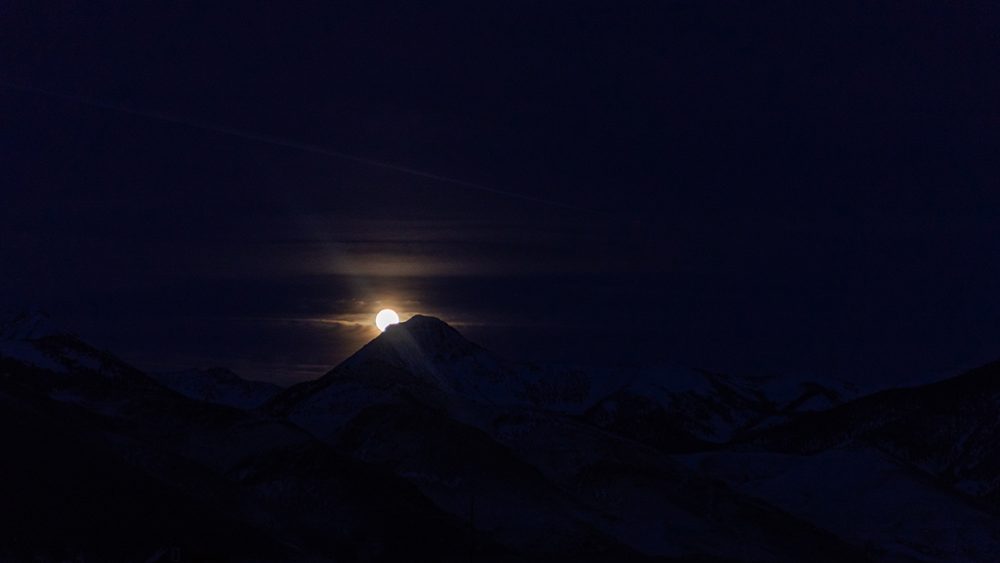



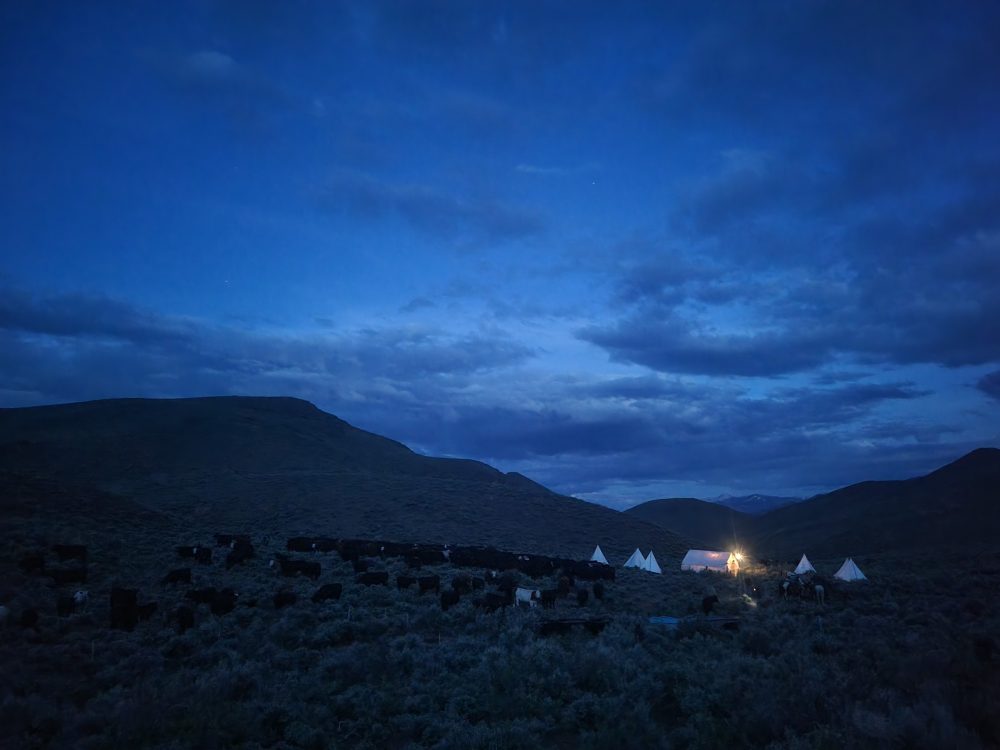



Natalie Blasco
Humans have some ways to go to demonstrate such kindness and respect to one another that you do to your animals.
Best wishes to everyone in the coming year.
Caryl Elzinga
Natalie
I think these animals actually have more to teach us about relating to humans than humans do. You too, have a blessed New Year, Natalie!
-Glenn
Mike Spence
Wow. Such a good read. You capture all the joys and sorrows of your ranch life. Can’t wait for the book!
Caryl Elzinga
Mike…
That book. Sadly I can’t even begin to conceptualize the block of time that would take!!!
-Glenn
Sara Reilly
Beautifully written, Glenn. Thanks for taking the time and effort, as we all begin this new year, to gently remind us that it’s not death that should be our focus, but rather a life well-lived.
Caryl Elzinga
Thanks Sara
May you all have a blessed New Year. So good to hear from you. Indeed, “a life well lived (living!).”
-Glenn
Leo Younger
Each moment is forever. Like many, I know there is an afterlife.
Caryl Elzinga
I agree Leo. Thanks for this.
-Glenn
Skyler Epperson
Doing right ain’t always easy. Bless you for doing the hard things that are right.
Caryl Elzinga
Skyler
Dang right. Well said. I think we owe right to the animals and the land under their feet.
-Glenn
Shirley
Losing loved ones, whether human or animal, produces emotional wounds. But as you so eloquently stated, we eventually form scar tissue which is a constant reminder, but is emboldened with fond memories. Thank you for your weekly stories. I so look forward to reading them!
Caryl Elzinga
Shirley
Thanks for you kind words. I am so glad we have those memories. Thanks for the ‘thanks’ on the stories! I have to say that so much of the time, the keyboard is stagnant, and I have to be obedient and…just start typing. And sometimes, something from the heart emerges unexpectedly.
-Glenn
Alice F. Engle
Glenn,
Thank you for this beautiful story. I am only one of many that lost loved ones this past year. Three to be exact! I was still processing the pain of loss when, I myself was at death’s door with Covid. GOD’S hand was upon me and brought me through it plus BreeAnn Petrie PA/C from Challis. GOD BLESS her and all of the GODLY stewards of land & animals at the Alderspring Ranch.
Believing & trusting in GOD for a precious new year in 2022. 🙂
Sincerely.
Alice Engle
Caryl Elzinga
Alice.
We LOVE BreAnn and Joe!!! Yes!
It’s hard to talk of the loss. But when I write about it, it seems to help a little. I am so glad you made it through covid. Caryl and I both had covid, and then Long Haul Covid for a whole year. We are finally finding our way out of that woods, thank God. It has been really tough ranching with that hanging over us. No air, no energy, no nothing (we thought about quitting).
I hope and pray that this year, 2022 will be better for us ALL. We love you, Alice!
-Glenn